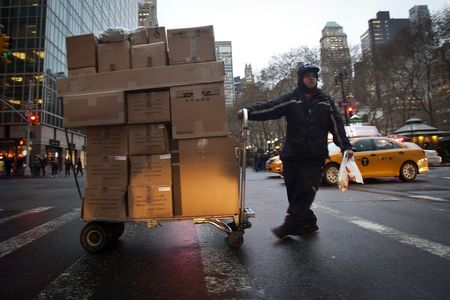By David Lawder and Andrea Shalal
WASHINGTON (Reuters) -The U.S. tariff exemption for package shipments valued under $800 ended on Friday, raising costs and disrupting supply chain models for e-commerce companies, small businesses using online marketplaces and consumers alike.
The U.S. Customs and Border Protection agency began collecting normal duty rates on all global parcel imports, regardless of value, country of origin, or mode of transportation at 12:01 a.m. EDT (0401 GMT) on Friday. It offered a flat-rate duty option of $80 to $200 per package shipped from foreign postal agencies for six months.
The change broadens the Trump administration’s cancellation of the de minimis exemption for packages from China and Hong Kong in May as part of an effort to halt shipments of fentanyl and its precursor chemicals into the U.S..
“President Trump’s ending of the deadly de minimis loophole will save thousands of American lives by restricting the flow of narcotics and other dangerous prohibited items, and add up to $10 billion a year in tariff revenues to our Treasury,” White House trade adviser Peter Navarro told reporters on Thursday.
A senior administration official said the change was permanent, adding that any push to restore the exemptions for trusted trading partner countries was “dead on arrival.”
The de minimis exemption has been in place since 1938, starting at $5 for gift imports and was raised from $200 to $800 in 2015 to foster small business growth on e-commerce marketplaces.
But direct shipments from China surged after President Donald Trump raised tariffs on Chinese goods during his first term, creating a new direct-to-consumer business model for e-commerce firms Shein and Temu.
The National Coalition of Textile Organizations hailed a “historic win” for U.S. manufacturing following the closing of a loophole that allowed foreign fast-fashion firms to avoid tariffs and import apparel sometimes made with forced labor, undercutting American jobs.
“The administration’s executive action closes this channel and delivers long overdue relief to the U.S. textile industry and its workers,” the group said.
CBP has estimated that the number of packages claiming the de minimis exemption jumped nearly 10-fold from 139 million in fiscal 2015 to 1.36 billion in fiscal 2024 – a rate of nearly 4 million per day.
HIGHER COSTS, MORE PAPERWORK
Retail analysts say that the end of de minimis is likely to raise prices for many goods sold through e-commerce companies as those that previously avoided tariffs because of the exemption will ultimately be charged duties. This may put such firms on a par with costs for more established retailers like Walmart that tend to import merchandise in bulk containers that are subject to tariffs.
It is also likely to curb trade on peer-to-peer platforms, such as eBay and Etsy, used by small businesses to sell secondhand, vintage or handmade items.
CBP has collected more than $492 million in additional duties on packages shipped from China and Hong Kong since their exemptions were eliminated on May 2, another Trump administration official said.
The official said that full tariff rates will apply to all packages shipped by express carriers such as FedEx, United Parcel Service and DHL. These companies are better set up to collect duties and process customs data than traditional postal agencies.
Foreign postal agencies can opt to collect and process the duties based on the value of the package contents, or opt for the flat rate method by collecting a flat tax based on Trump’s tariff rates currently in place on goods from the country of origin.
Based on CBP guidance issued on Thursday, parcels would be charged $80 from countries with Trump-imposed duty rates below 16%, such as Britain and the European Union, $160 from countries between 16% and 25%, such as Indonesia and Vietnam, and $200 from countries above 25%, including Brazil, Canada, China and India.
But postal services must shift to full “ad valorem” duty collection based on the value of the shipments by February 28, 2026, the second official said.
This official said some foreign postal services have suspended mail to the U.S. but that the administration was working with foreign partners and the U.S. Postal Service to minimize disruptions.
European postal groups including Germany’s DHL and Norway’s Posten Bring on Friday were seeking ways to handle the new fees and extra paperwork.
DHL has suspended shipments of standard parcels for businesses and Posten Bring paused shipments of packages under $800.
“We are now working together with other postal companies in Europe and the world to find a solution for paying customs duties on the packages,” said Posten Bring.
Britain’s Royal Mail resumed shipments on Thursday, saying customers can send parcels paying any duties upfront, as well as a handling fee to cover additional costs of clearance into the U.S..
Kelly Ann Shaw, a former senior White House trade official during Trump’s first term, said she expected the removal of the de minimis exemption to cause some initial turmoil.
“I think there will be growing pains as this unfolds, but it is U.S. law,” said Shaw, now with the Akin Gump law firm in Washington. “There will be a bit of a transition time while CBP figures out how to process these low-value shipments, which it hasn’t had to do in many years.”
(Reporting by David Lawder; Additional reporting by Ludwig Burger in Frankfurt and Stine Jacobsen in Copenhagen;Editing by Christian Schmollinger and Barbara Lewis)











